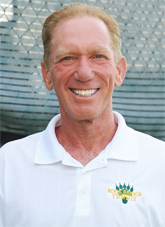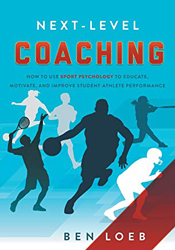Techniques for
Developing Confidence
Ben Loeb
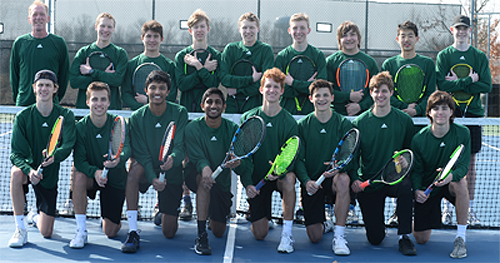
In the first article in this series, I talked about the importance of unconditional self-acceptance as one of the foundations of true confidence. (Click Here.)
Tennis gives you an opportunity to learn a lot about yourself. If you have confidence, you need to use it effectively. If you don't have enough of it, you need to learn what you can do to genuinely become more confident.
To build more confidence, focus more on building a better version of yourself. If you can do that, it will improve your chances of getting desired outcomes more often.
Now let's explore some specific techniques that I have used with players at all levels and with my championship teams that can help you build that better version.
Picturing Success
The first technique is picturing success. This means learning to vividly visualize yourself succeeding. Here is mu suggested sequence, one that starts well before actual play.
Visualize yourself or you and your teammates going through your pre-game stretch and movement routine. Then visualize your warm-up.
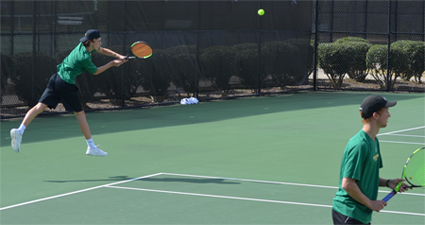
Now visualize how you will look, feel, and act at the beginning of the match. Visualize the first several points, as you deal with any nervousness and settle into the contest.
Visualize how you will handle the key moments in matches, including how you will finish them. Visualize various scenarios of how you will succeed in those moments.
It can be hard for many players to close out a match, especially if they are the underdog, so you need to imagine yourself doing it. If you can see and believe in your own success, your mind will be convinced it is in familiar territory during the competition itself. The state of mind initiated by your imagination following this progression will create more confidence over time.
Positive Self Talk
The second technique is positive self-talk. Your mind manifests into action the thoughts you dwell upon most. Make those thoughts positive or geared toward what you want to happen, rather than what you don't want to happen.
Instead of thinking to yourself that you might miss an easy sitter, tell yourself you will make it. Imagine getting your first serve in at critical times. Tell yourself you will hit a great return when you have break point. These thoughts can help you perform with conviction.
Mental Imagery
Using mental imagery involves picturing yourself performing as you desire to before you even step onto the field or court. The more you train your mind to focus on the right things, the more it will respond.
This mental imagery prepares you to see how you want to perform during the contest, and it also allows you to imagine how you will handle any type of adversity. Use mental imagery to picture yourself being relaxed and in a state of flow.

Picture Blue
Imagine the color blue. Some players find it helpful to visualize the color inside a square or a circle, while others visualize it with no parameters. The color of deep, vibrant blue represents confidence, boldness, and calmness. Allow the image of this color to help you refocus on your current task from a strong and stable peace of mind.
Present Focus
Focusing on the present helps with confidence because it keeps you away from "what ifs." What if I double fault?" The list of possible negative consequences and "what-if" scenarios goes on and on in tennis.
If you focus on the here and now, you perform in the moment. When you perform in the moment, you are likely to perform with more confidence.
To achieve this focus on process, you must concentrate on the things that you can control. Some examples of these are practice efficiency and intensity, routines, game plans, technique assessment, and reaction to your own thoughts and feelings--even your reaction to the ebbs and flows in your confidence itself.
Focus on these controllable elements, instead of uncontrollable factors like the weather, what other people think or say, or the coaches' decisions.
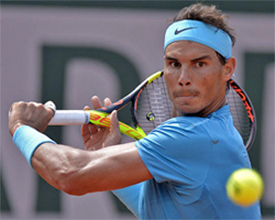
Focus also on what you are doing right. It's important to learn from your mistakes, but don't dwell on them. Your confidence will diminish if you spend too much time thinking about your mistakes. Your confidence will increase if you primarily focus on what you are doing right.
Concentrate on the process, not outcomes. By focusing on the process of improving, you are focusing on something within your control. You have influence on outcomes, but not control over them. If you focus on the process and you still lose, you may be disappointed, but your confidence should not waver as much and you won't be as deterred as you would have had you focused on the outcome.
Focus on yourself, not others. Concentrate on your own performance and personal improvement physically, mentally, and emotionally. Focus on what you need to do to improve individually or as a team. When you experience improvement, your confidence will grow.
In discovering "the right process for you," you will come to realize that your confidence will fluctuate. Consequently, don't get upset with yourself when your confidence goes down. Focus on what you need to do and how you need to think to get your confidence going again.
Ignore Results to Get Them
It is common in competitive athletics to be results oriented. Some players are obsessed with results. We absolutely hate to lose, and we love to win.

In fact, some players hate to lose more than they love to win. So how should athletes and coaches deal with a preoccupation with winning while we are playing the game?
Jim Taylor, a well-regarded sport psychologist, has an interesting and effective take on this. Taylor has suggested that there are a lot of misconceptions about the role of results in achieving your athletic goals.
He suggests you need good results to be successful, but the question is how to go about getting those results. What are you focusing on during competition? Are you focusing on the outcome or the process?
An outcome focus involves focusing on results, rankings, and beating others. This focus prioritizes things outside of the athlete's control. A process focus involves focusing on what you need to do to perform your best, such as improving your pre game preparation, technique, strategy, or psychological perspective. A process focus centers entirely on you.
It is not uncommon for some athletes to think that to get the results they want, they need to focus on them. But having an outcome focus actually reduces the chances of achieving the results you want.
If you're focused on the outcome, you aren't focused on what you need to do to perform your best during competition. What makes you nervous before a competition is typically the outcome, not the process.
A bad outcome such as not winning or achieving your goals takes away from your optimal focus in the moment and creates unnecessary stress. The bottom line is that when an athlete focuses on the outcome, they are far less likely to get the outcome they want.
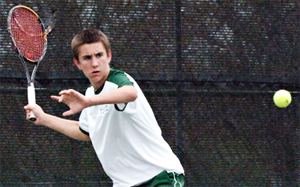
In contrast, when players focus on the process of achieving that outcome rather than on the outcome itself, they increase their chances of getting the results they want. The process is action oriented while the outcome is results oriented.
If an athlete performs well, they are more likely to achieve the desired result. It is important to focus on the things that create winning and not on winning itself.
Even if it's best to not think about winning, it is unrealistic to expect an athlete not to think about results at all. Consequently, your challenge is to determine what to do when your mind fixates on results.
Become aware when you are focusing on the outcome. Once you are aware of your outcome focus, recognize that you can only focus on one thing at a time. If you can replace your outcome focus with a focus on something else, you can stop yourself from thinking about results. Ideally, you should refocus on something that will enable you to perform your best.
Why Do You Compete?
Is it for the love of competition, to bring out the best in yourself, be part of a team, or to have fun? Answering this question gets you out of thinking mode and into a feeling mode. This generates powerful emotions, such as excitement, inspiration, and pride, that will get you fired up about getting out there and performing the very best you can.
Practice all these techniques on and off the court. Make them a regular part of your tennis life. They have the proven potential to help you deal with whatever arises in your matches and play your best regardless of circumstances.



